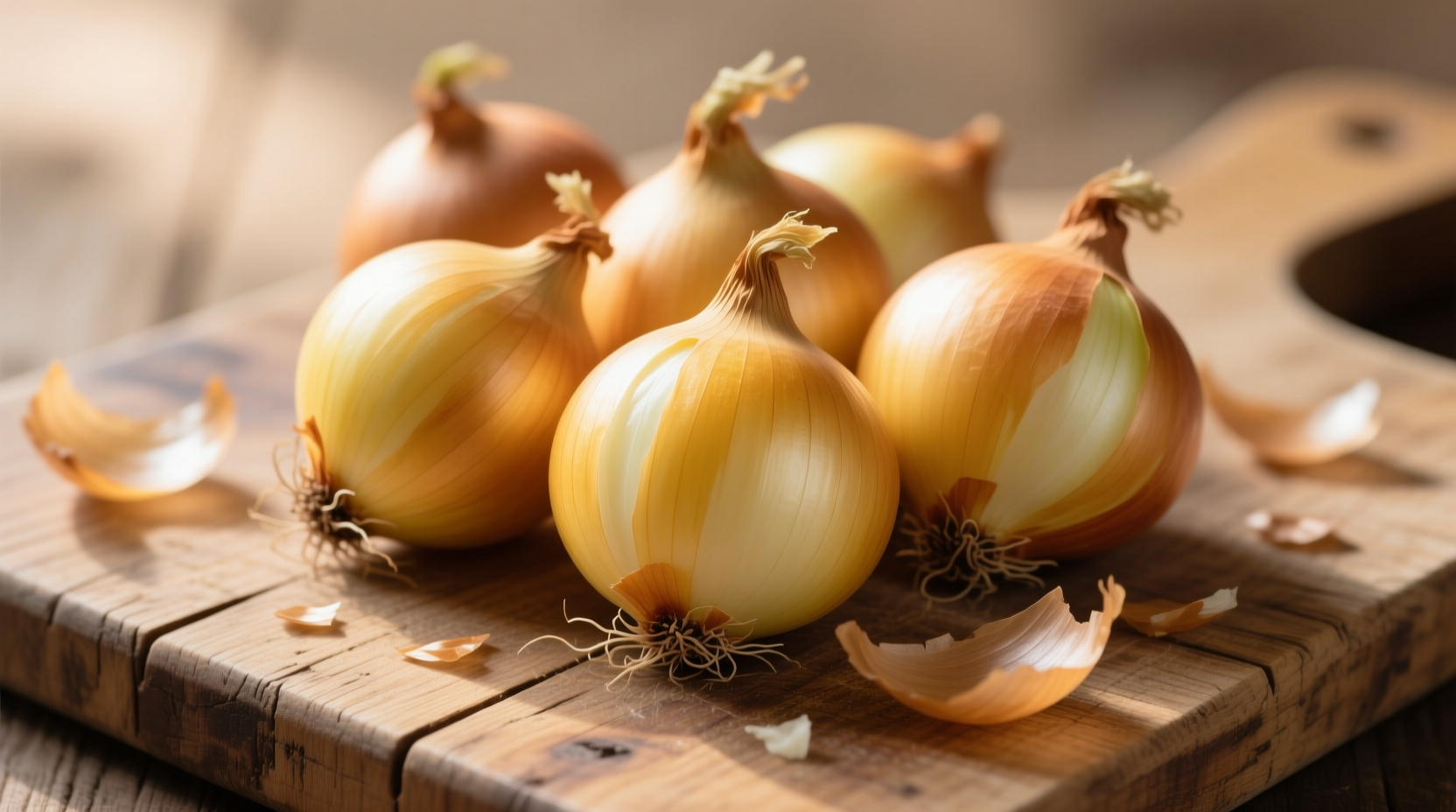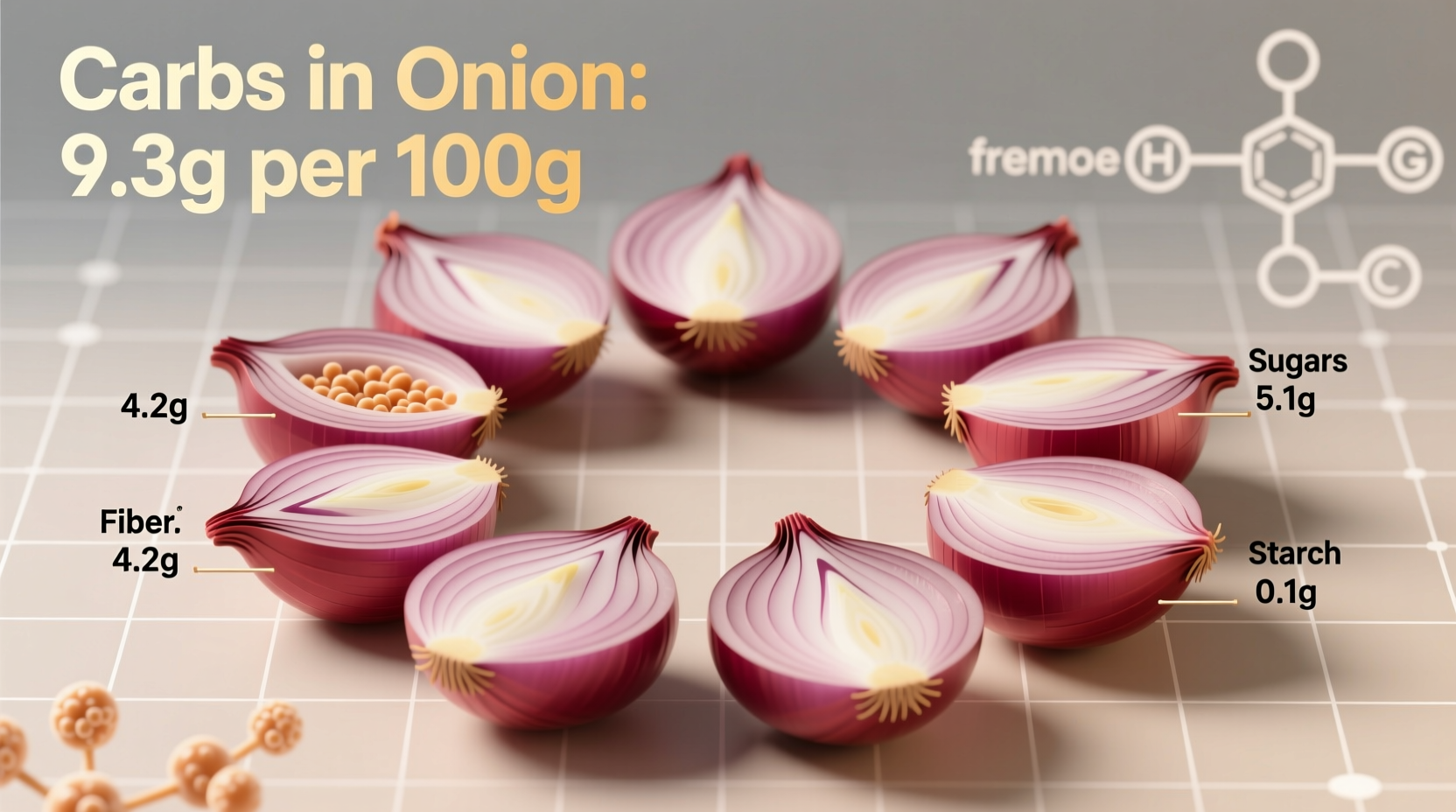Understanding the carbohydrate composition of onions helps home cooks and health-conscious eaters make informed decisions about this kitchen staple. While onions add incredible flavor to dishes worldwide, their carb content matters for those managing diabetes, following low-carb diets, or tracking nutritional intake precisely.
Onion Carbohydrate Breakdown by Variety
Not all onions are nutritionally identical. The carbohydrate content varies slightly between common varieties based on water content and natural sugar concentration. The USDA FoodData Central database provides the most reliable measurements for raw onions:
| Onion Type | Carbs per 100g | Fiber Content | Sugars | Net Carbs* |
|---|---|---|---|---|
| Yellow Onion (raw) | 9.34g | 1.7g | 4.24g | 7.64g |
| Red Onion (raw) | 9.53g | 1.8g | 4.41g | 7.73g |
| White Onion (raw) | 8.97g | 1.6g | 4.03g | 7.37g |
| Green Onions (raw) | 6.96g | 2.6g | 2.79g | 4.36g |
| Shallot (raw) | 15.94g | 3.1g | 7.87g | 12.84g |
*Net carbs = Total carbs minus fiber. Source: USDA FoodData Central
How Cooking Changes Onion Carbohydrates
Many home cooks wonder whether cooking affects onion carb content. The cooking process concentrates carbohydrates as water evaporates, but doesn't significantly alter the total carb count per serving:
- Sautéed onions: 1 cup (160g) contains approximately 14.9g total carbs (more concentrated due to reduced volume)
- Caramelized onions: The natural sugars undergo the Maillard reaction, but total carbohydrate content remains similar to raw (about 9-10g per 100g)
- Roasted onions: Minimal change in carb composition, though some sugars may caramelize on the surface
When tracking carbohydrates for medical or dietary reasons, remember that cooking reduces volume but not total carbohydrate content. A cup of raw chopped onions (160g) contains about 15g carbs, while that same cup of cooked onions represents significantly more raw onion material.

Practical Dietary Considerations
For most people, the carbohydrate content in onions presents no concern. However, specific dietary contexts require attention to onion portions:
Keto and Low-Carb Diets
Onions contain moderate carbohydrates that can challenge strict ketogenic diets (typically limited to 20-50g net carbs daily). Consider these practical approaches:
- Use green onions instead of bulb onions (nearly 40% fewer net carbs)
- Limited to 2-3 tablespoons of finely diced onion per serving when following strict keto
- Substitute with asafoetida (hing) for onion flavor in Indian cuisine with minimal carbs
- Save your carb budget for onions in dishes where flavor impact justifies the carb count
Diabetes Management
While onions contain carbohydrates, they also provide chromium and sulfur compounds that may support blood sugar regulation. The American Diabetes Association considers onions a non-starchy vegetable suitable for diabetes meal plans when consumed in standard culinary portions (typically 1/4 to 1/2 cup per serving).
Understanding Fructans in Onions
Onions contain fructans, a type of carbohydrate that functions as prebiotic fiber. While technically counted in total carbohydrates, fructans provide only partial caloric value as humans lack the enzyme to fully break them down. This explains why some people experience digestive discomfort from onions despite their moderate carb count.
Maximizing Flavor While Managing Carbs
Professional chefs use several techniques to extract maximum onion flavor while minimizing carbohydrate impact:
- Infusion method: Simmer onion slices in cooking liquid, then remove before serving to capture flavor without the bulk
- Layering technique: Use small amounts of high-quality onions at multiple cooking stages rather than one large addition
- Varietal selection: Choose stronger-flavored varieties like red onions where smaller quantities deliver equivalent flavor impact
- Combination approach: Blend onions with lower-carb aromatics like celery and bell peppers to distribute flavor impact
These professional techniques allow home cooks to maintain rich flavor profiles while managing carbohydrate intake effectively.
Common Misconceptions About Onion Carbs
Several myths persist about onion carbohydrates that deserve clarification:
- Myth: Cooking significantly reduces onion carbs
Fact: Cooking concentrates carbs as water evaporates but doesn't destroy carbohydrates - Myth: All onion varieties have identical carb content
Fact: Shallots contain nearly 70% more carbs than white onions per equivalent weight - Myth: Onion carbs cause significant blood sugar spikes
Fact: The glycemic load of a typical onion serving is low due to fiber content and small portion sizes used











 浙公网安备
33010002000092号
浙公网安备
33010002000092号 浙B2-20120091-4
浙B2-20120091-4